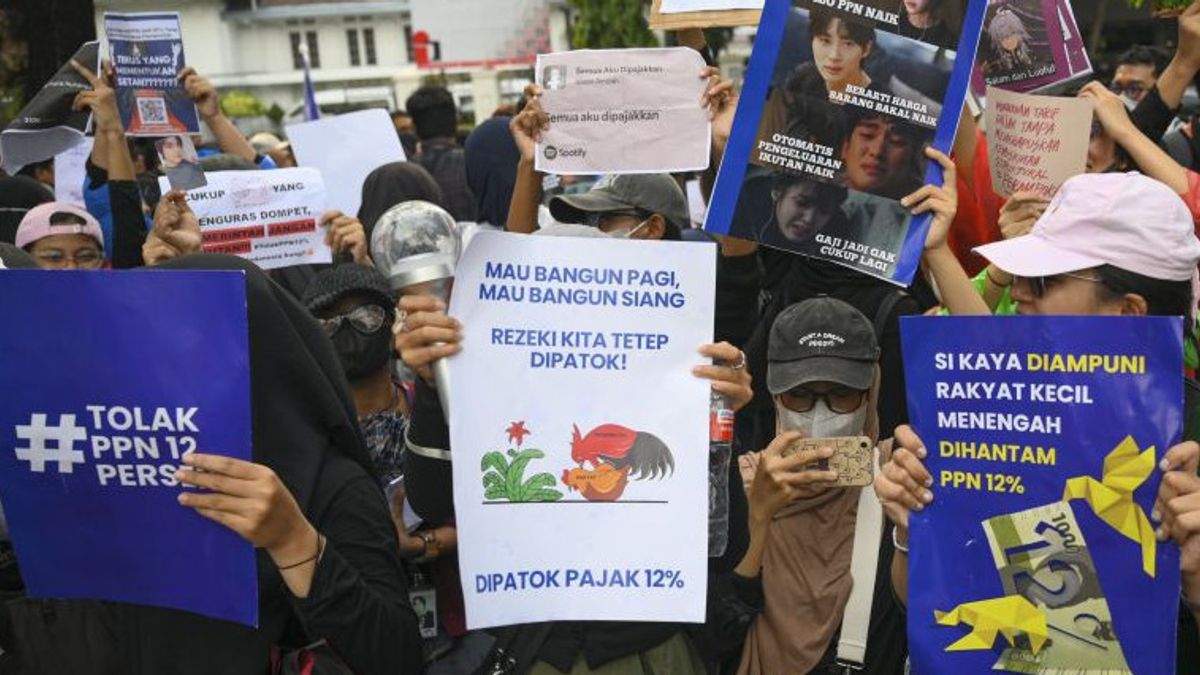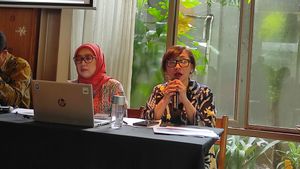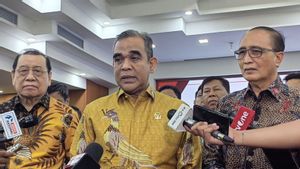JAKARTA - Head of Bank Permata Economist Josua Pardede said the government must be able to mitigate the potential for reducing people's purchasing power from the impact of implementing a 12 percent value added tax (VAT).
"The government must focus on mitigating the risk of purchasing power reduction through the MSME welfare and empowerment program," said Josua in a statement in Jakarta, quoted from Antara, Monday, December 23.
He emphasized that the government must really be able to ensure that a number of incentives prepared are able to protect people's purchasing power from the impact of the implementation of the 12 percent value added tax (VAT), which is planned to take effect as of January 1, 2025.
"This policy is appropriate to improve the fiscal approach as long as compensation in the form of incentives is really effective in maintaining the purchasing power of vulnerable people. Moreover, the government ensures that basic goods, health services, education, and public transportation are free of VAT," he said.
To ensure that the policy remains in favor of the community, a number of incentives have been prepared by the government to protect the purchasing power of low-income groups and support productive sectors, especially micro, small and medium enterprises (MSMEs) and labor-intensive sectors.
He said that this optimization has the potential to increase the productivity of labor-intensive sectors, the automotive industry, and property through the implementation of the Government-borne VAT (DTP) scheme.
This policy will create additional demand for these sectors. The government also shows its commitment to supporting the labor-intensive sector by providing interest subsidies and PPh incentives Article 21 for workers in this sector," he said.
In addition, the government will exempt VAT for small entrepreneurs with turnover below IDR 4.8 billion, as a concrete step to encourage the growth of MSMEs. Overall, the strategy is focused on strengthening export-oriented industries and creating new jobs.
"Through targeted incentives, the optimization of VAT not only supports productive sectors such as MSMEs and priority industries, but also strengthens the national economic foundation," he said.
In the context of global competitiveness, according to him, this policy can be an opportunity to strengthen Indonesia's economic structure. Through the implementation of selective VAT such as targeting luxury goods and services as well as providing incentives for the productive sector, Indonesia has the opportunity to strengthen its economic foundations.
"The 12 percent VAT policy has significant potential to increase state revenue and encourage a long-term economy if it is balanced with the right incentives," he said.
To maximize this potential, strategic steps that can be taken include the development of value-added industries through downstreaming, encouraging green investment such as electric vehicles, and strengthening the integration of MSMEs into the global supply chain. This approach is expected to create a stronger, inclusive, and sustainable economic ecosystem.
Meanwhile, Benny Sufami's Co-Founder Grows Meaning (TMB) said the optimization of VAT could affect people's investment patterns and purchasing power, which had an impact on the performance of issuers, stock indexes, and the space for monetary policy movement.
To minimize this impact, he encouraged the government to be able to maintain domestic stability by implementing measurable policies.
"Including providing direct assistance to low-income groups. If managed properly, the funds collected from VAT can support development and improve community welfare," he said.
He said the increase in VAT rates from 11 percent to 12 percent was the mandate of Law Number 7 of 2021 concerning Harmonization of Tax Regulations.
"The increase in VAT aims to increase state revenue which will be channeled back to the education, health, infrastructure and other government programs sectors," he said.
SEE ALSO:
Even though it has a positive goal, according to Benny, the government needs to look at the current situation very carefully through monitoring people's purchasing power, especially in the lower middle class because it will affect economic growth. The community needs to prepare themselves to face the impact of optimizing the VAT.
The biggest challenge is in the first three months as a transition period, where prices for goods tend to rise. The government stimulus in this period has become very important," he said.
In addition, the community needs to strengthen financial literacy by prioritizing important expenditures and reducing non-essential costs, the public also needs to find additional sources of income, such as skills training that can help improve financial stability.
The English, Chinese, Japanese, Arabic, and French versions are automatically generated by the AI. So there may still be inaccuracies in translating, please always see Indonesian as our main language. (system supported by DigitalSiber.id)
















